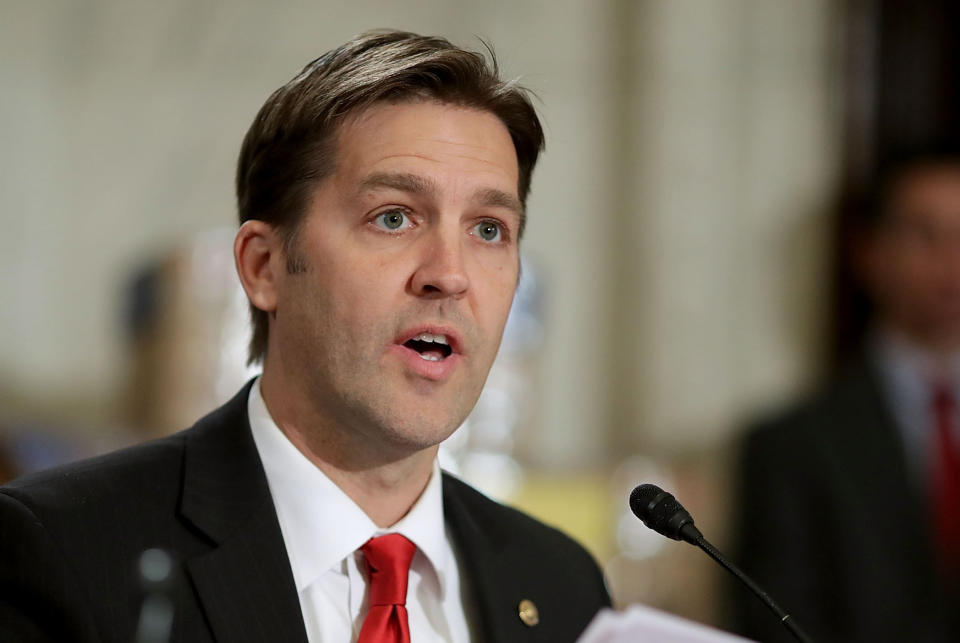Clashing views of America: Sen. Sasse challenges the alt-right
Sen. Ben Sasse, in a speech last week to a gathering of Christian pastors, went out of his way to criticize the alt-right, a movement that equates American greatness with preserving white Protestant culture.
“American exceptionalism was never a claim about ethnicity. American exceptionalism was never a claim about Americans’ unique anthropology,” Sasse, a Nebraska Republican, said at an annual meeting of a group called the Gospel Coalition, in Indianapolis.
“American exceptionalism was an understanding about the historical moment in which the American founding flipped on its head the relationship between rights and government,” said Sasse.
The Harvard- and Yale-educated Sasse said in the middle of a 30-minute speech that America at its founding was unique in its claim that rights were inalienable to each person, and automatic, rather than determined by the whims of government.
“The American founding is a claim that God gives us rights, not government, and government is our secular-shared project to secure those rights. That’s all American exceptionalism means. That’s what Washington used to mean,” Sasse said.
America’s identity is bound up first and foremost in an idea, Sasse said, and not a piece of land or a certain racial group.

The claim that America’s greatness originated or resides in European or white Christian culture has become a central plank to many who have supported President Trump’s political rise.
“The rise of Donald Trump, perhaps the first truly cultural candidate for President since [Pat] Buchanan, suggests grassroots appetite for more robust protection of the Western European and American way of life,” wrote Milo Yiannopoulos and Allum Bokhari for Breitbart News a year ago in an influential explanation of the movement.
“They [the alt-right] truly believe that multiethnic democracies cannot succeed,” said Ben Shapiro, a former top writer at Breitbart, who now runs the Daily Wire.
Yiannopoulos and Bokhari described much of what’s known as the alternative right as a reaction to liberalism and identity politics among racial minorities. “Donald Trump would not be possible without the oppressive hectoring of the progressive Left,” they wrote, describing progressives as the real “authoritarians” in contemporary culture.
A perceived bias against white people drives much of the alt-right’s resentment. “Any discussion of white identity, or white interests, is seen as a heretical offense,” wrote the Breitbart authors.
There is also the alt-right view that many traditional conservatives lack the will to fight the left on cultural issues.
“The alt-right would argue that [traditional conservatives are] too afraid of being called ‘racist’ to seriously fight against [political correctness],” Yiannopoulos and Bokhari wrote.
And they contended that while there are neo-Nazis and white supremacists among the alt-right, the majority of the movement is populated by young people who like to transgress against social taboos and by more average conservatives who “want their own communities, populated by their own people, and governed by their own values.”
“They would prefer nonviolent solutions,” they wrote.
And, they said, the movement is not going away. “No matter how silly, irrational, tribal or even hateful the Establishment may think the alt-right’s concerns are, they can’t be ignored, because they aren’t going anywhere,” Yiannopoulos and Bokhari wrote. “The Left can’t language-police and name-call them away, which have for the last twenty years been the only progressive responses to dissent, and the Right can’t snobbishly dissociate itself from them and hope they go away either.”

But influential alt-right figures like Yiannopoulos and Trump adviser Steve Bannon have lost influence recently. Yiannopoulos lost his job with Breitbart in February when it came to light that within the past year he had defended sexual contact between grown men and underage boys.
And Bannon, who ran Breitbart News until becoming a top adviser to Trump during the presidential campaign, is now in danger of losing his job at the White House after clashing repeatedly with Trump’s son-in-law, Jared Kushner.
At the Conservative Political Action Conference in February, Bannon described the heart of the movement he believes has driven Trump to power. “The center core of what we believe — that we’re a nation with an economy, not an economy just in some global marketplace with open borders, but we are a nation with a culture and a reason for being — I think that’s what unites us,” Bannon said.
Bannon has also defined American nationalism in opposition to Islam, especially ISIS pretensions to a new Islamic caliphate. Bannon said in 2014 that he is worried about the future of the “Judeo-Christian West” because “we are in an outright war against jihadist Islamic fascism … and this war is, I think, metastasizing far quicker than governments can handle it.”
Whatever the future holds for Bannon or Yiannopoulos, however, it’s likely that conservatives will be having this debate among themselves for some time, and Sasse — who was an outspoken critic of Trump during the presidential campaign — is one of the first elected officials to go out of his way to address it philosophically.

Sasse has spoken out against the alt-right’s thinking on a handful of occasions over the past year. He has agreed with part of the alt-right’s complaint that the modern left is intolerant of those who disagree with them and that the Democrats’ focus on minorities tends to divide Americans on ethnic lines. But he rejects the alt-right’s response.
“A lot of what is happening in the Republican electorate right now is the downstream effects of the tribalism of race, class and gender-identity politics on the left,” Sasse said just over a year ago. “Some on the right have decided, if they’re going to have an identity politics, we need one too. But we already have one postconstitutional party. We don’t need another one.”
And in February of this year, he said on “Morning Joe” that the Republican Party is experiencing a “rising tribalism.”
“We’re in danger of heading toward a kind of identity politics that the left’s had for quite some time,” he said. “I’m against identity politics. I’m for an idea politics that talks about what America means and what we’re for together.”
Read more from Yahoo News:
All eyes on Kansas in first congressional election of Trump era
Asian passenger forcibly removed from United flight in U.S. causes outrage in China
Rep. Joe Wilson, who yelled ‘You lie!’ at Obama, hears same at town hall
Gabby Giffords on San Bernardino school shooting: Events like these no longer ‘unimaginable’
Photos: Ten most endangered rivers in the United States for 2017


